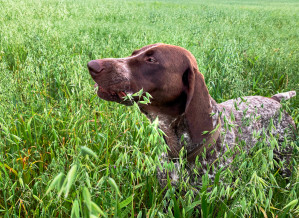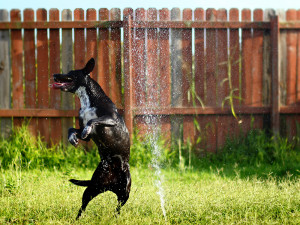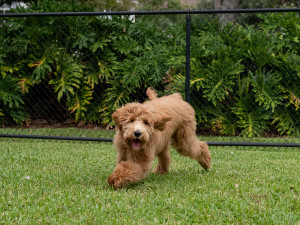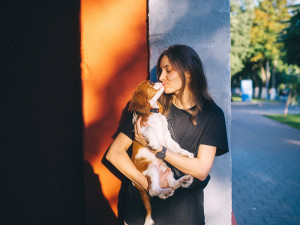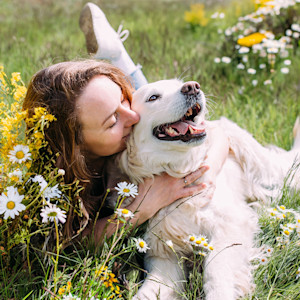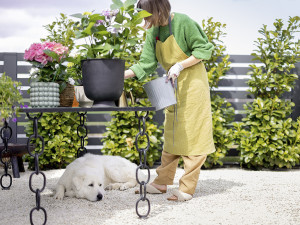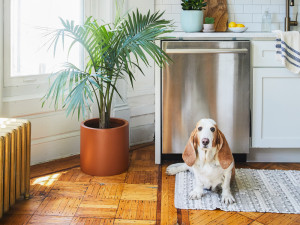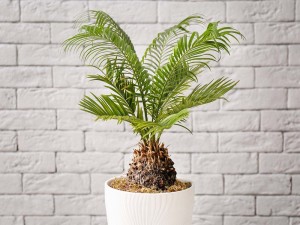Is Lawn Fertilizer Toxic to Dogs?
It keeps your grass lush and green, but your pup shouldn’t ingest it. Here’s why.

Share Article
You usually worry about what plants are toxic to your dog, especially this time of year, when gardens are in full bloom. But there’s something else that should be on your radar: the food that feeds those plants. Along with your gorgeous perennials, you want your lawn to look healthy, but you also don’t want to use any products that could jeopardize your dog’s health. Unfortunately, many grass fertilizers, which can help your yard look like a suburban paradise, are toxic to dogs.
While most fertilizers aren’t life-threatening to your dog with minimal exposure, they can be highly toxic if ingested. And we all know dogs are curious creatures who often explore the world with their mouths. You don’t have to give up on having your dream lawnopens in a new tab, but it’s important to understand the dangers many fertilizers present to dogs before using them on your grass.

littleKin™ is Kinship’s home just for puppy and kitten parents. Bop over to check out expert advice, new pet tools, and special deals—all curated for your newest family member.
opens in a new tabWhy is grass fertilizer dangerous to dogs?
Like many products that contain chemicals, fertilizer can be hazardous to dogs because of its ingredients. Commercial lawn fertilizers usually include substances like nitrogen, phosphorus, and potassium, as well as herbicides and pesticides, all of which can be harmful to dogs if ingested or, in some cases, inhaled.
Even the residue of freshly applied fertilizer could cause irritation to your pet’s paws — and lead to ingestion if they try to lick their feet clean. And if your fertilizer isn’t safely stored in a place your dog can’t reach, they could grow curious and eat it, leading to vomiting, diarrhea, and even more serious health issues.
What should I do if my dog has eaten fertilizer?
If your dog has consumed fertilizer, take them to the veterinarian immediately. Depending on the time of day, you may have to go to the emergency vetopens in a new tab for care. You can also call the Pet Poison Helpline at 855-764-7661 or the ASPCA Animal Poison Control Centeropens in a new tab at (888)-426-4435 to determine if your dog needs immediate attention.
Diagnosing fertilizer poisoning in dogs
Make sure to bring the fertilizer packaging to the vet, so they can get a clear idea of what your dog has eaten. Your vet will likely perform blood tests and a urinalysis to evaluate your dog’s condition and may even recommend inducing vomiting. Depending on how much fertilizer your pet has consumed, your dog may need X-rays to look for any obstructions.
Symptoms of fertilizer poisoning in dogs
If you suspect your dog has consumed fertilizer, look for the following signs:
Diarrhea
Tremors and/or seizures
Severe lethargy
Abnormal heart rate
Excessive drooling
Frequent urination
If you notice any of the above symptoms, get your dog to the vet immediately.
Treatment
While it may be difficult to assess, do your best to figure out how much fertilizer your dog ingested and bring the packaging to show the vet so they can see the ingredients. The vet may induce vomiting or, in severe cases, recommend hospitalization for additional therapy.
How to prevent fertilizer poisoning
While not using fertilizer at all is the best way to prevent fertilizer poisoning in your dog, there are other options that can save your yard and your pet’s health. Look for pet-friendly lawn care solutionsopens in a new tab, such as natural or organic fertilizers. Just make sure to closely read the labelsopens in a new tab and determine whether the ingredients are actually safe for your pet.
You can also consult lawn-care professionals, many of whom will happily provide services or guidance around pet-friendly lawn fertilization. And make sure to store any lawn products in places where your dog cannot access them.
If you have to use commercial lawn fertilizers, only apply them when your dog is inside and water the lawn after the application to help the fertilizer soak in.
Are all grass fertilizers poisonous to dogs?
Most commercial lawn fertilizers contain ingredients that are poisonous to dogs, especially if ingested. Even exposure to these products can cause irritated skin. Talk to a lawn care professional before using any product on your lawn.
How do I stop my dog from eating fertilizer?
Your dog may be curious about fertilizer because of the way it smells, so make sure to keep the container safely out of their reach. Never leave any lawn products in an area where your dog can get to it, such as on the floor of a garage or unattended in the yard.
The bottom line is: Is fertilizer poisonous for my dog?
Depending on the size of your dog and the amount they ingest, fertilizer can be highly toxic. While organic fertilizers are considered better for the environment, they may still be dangerous to your pet. Your best bet is to assume that any fertilizer is poisonous and plan any lawn care around your dog.
Plants that are safe for dogs
If you have a green thumb, you don’t have to give up gardening or enjoying plant life just because you have a dog. Below are a few plants that are safe for dogsopens in a new tab:
Spider plant
Boston fern
Prayer plant
Cat grass
Rosemary
Plants that are dangerous for dogs
Of course, not every plant is dog-safe. Keep these plantsopens in a new tab out of your home — or at least out of your pet’s reach:
Peace lily
Pothos
Cyclamen
Aloe vera
Sago palm
FAQs (People also ask):
What happens if dogs eat grass fertilizer?
Consuming fertilizer can cause digestive and abdominal issues, intestinal obstructions, and inflammation of the pancreas in dogs.
How much fertilizer is toxic to dogs?
The level of toxicity depends on the size of your pet, but it’s safe to assume that any amount of fertilizer is toxic and can have devastating results.
Are fertilizers poisonous to dogs if they smell them?
In most cases, your dog would have to ingest fertilizer (and a significant amount) to experience adverse effects, but it’s best to keep any fertilizer away from your dog.
References:
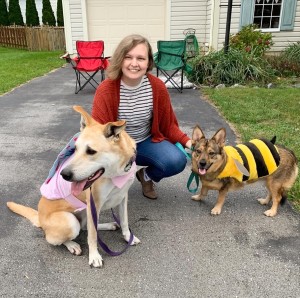
Savannah Admire
Savannah Admire is a writer, poet, and pet mom to three dogs and a cat. She currently lives in Western Maryland. When she’s not writing, you can find her reading, taking photos, or volunteering as a content creator for her local community theatre. Her debut poetry book, Mother Viper, is due out August 12, 2025, and you can follow her on Instagram at @savannahcooperpoetopens in a new tab.
Related articles
![Woman holding a beagle in warm dappled summer light]() opens in a new tab
opens in a new tabYou’ve Got a Summer-Lovin’ Pup. Here’s How to Keep Them Safe
Some like it hot (but not most dogs). Here are the season’s health hazards, from fleas to foxtails.
![woman hugging dog in field of daisies]() opens in a new tab
opens in a new tabAre Daisies Toxic to My Dog?
![A dog laying under a table outside while a woman cares for her plants.]() opens in a new tab
opens in a new tabFollow These 4 Pet-Safe Pest Control Tips for Your Summer Garden
You need to be extra careful if your dog or cat is your gardening assistant.
![Basset Hound sitting in a bright sunny apartment beside a potted palm tree]() opens in a new tab
opens in a new tabGarden Variety: Plants Safe for Our Pups
Boutique NYC nursery The Sill gives us the dirt on dog-friendly plants.
![Plant Kween standing in a greenhouse space wearing brightly colored pants and a beige corset top smiling in a carefree way]() opens in a new tab
opens in a new tabThe Plant Kween Has Spoken!
We’ve got the fabulous gardener’s take on pet-friendly plants.
![A Sago Palm in a white pot against a grey brick background]() opens in a new tab
opens in a new tabTwo Georgia Dogs Died After Consuming the Toxic Sago Palm
It looks cute, but this plant is incredibly deadly to dogs. Here’s everything you need to know.
